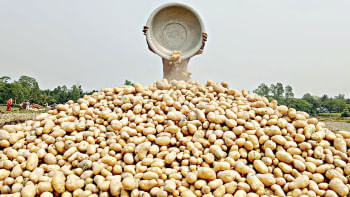The poet of Islamic Renaissance
 Farrurkh Ahmad is one of the most powerful poets of Bangla literature. He is widely known as the poet of Islamic Renaissance. Islam was not only the central point of his literature, it strongly guided his personal life, and his strong conviction in Islamic ideology. His poems symbolise the spirit of resurrection particularly in the hearts of downtrodden Muslims of the then (early '30s and '40s) Bengal.
Farrurkh Ahmad is one of the most powerful poets of Bangla literature. He is widely known as the poet of Islamic Renaissance. Islam was not only the central point of his literature, it strongly guided his personal life, and his strong conviction in Islamic ideology. His poems symbolise the spirit of resurrection particularly in the hearts of downtrodden Muslims of the then (early '30s and '40s) Bengal.
Ahmad was born in the village of Majhail of Magura District in 1918. He was the second son of Syed Hatem Ali and Begum Rawshan. He graduated from Khulna Zilla School in 1937 and did his intermediate from Ripon College, Kolkata in 1939. He enrolled at the prestigious Scottish Church College and did his BA (Hons) in Philosophy and English Literature, but did not complete graduation. He started writing poems during his school life.
As a student, Ahmad was attracted to the radical humanism of MN Roy and participated in leftist politics.
Immediately after the partition in 1947, Ahmad joined Radio Pakistan (now Bangladesh Betar), Dhaka and served as staff artiste till his death in 1974. Despite his Pakistani and Islamic ideals, he supported the Language Movement in 1952 and, later, the Liberation War in 1971.
Ahmad's literary works include “Sat Sagorer Majhi”, “Sirazam Munira”, “Naufel O Hatem”, “Muhurter Kabita”, “Dholai kabob”, “Hatemtayi”, “Habida Marur Kahini”, “Kafela”, “Sindabad” and “Dilruba”.
Compiled by Correspondent

 For all latest news, follow The Daily Star's Google News channel.
For all latest news, follow The Daily Star's Google News channel. 



Comments